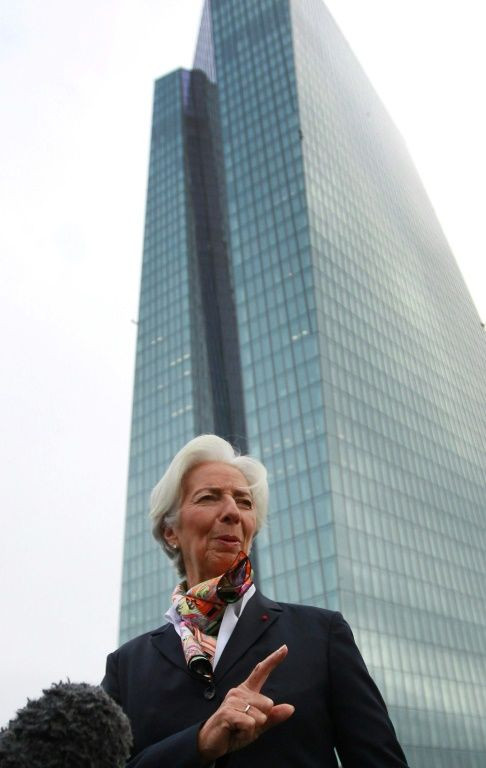Thursday's Stock Market Open: Us Equities Open Slightly Lower As ECB Keeps Rates Unchanged At Historic Lows

U.S. stocks have jumped after President Donald Trump said a trade deal with China is imminent.
Shortly after markets opened, Trump tweeted “Getting very close to a big deal with China. They want it, and so do we!”
Getting VERY close to a BIG DEAL with China. They want it, and so do we!
— Donald J. Trump (@realDonaldTrump) December 12, 2019
The Wall Street Journal reported that U.S. trade officials offered to cancel new tariffs on China and cut existing tariffs on Chinese imports by up to 50% on $360 billion of imports.
“This has become a buy high, sell higher market, and today’s strength is related to a U.S.-China trade deal that seems to be coming together,” said Terry Sandven, chief equity strategist at U.S. Bank Wealth Management told MarketWatch.
The Dow Jones Industrial Average gained 126.01 points to 28,037.31 while the S&P 500 rose 16.18 points to 3,157.81 and the Nasdaq Composite Index climbed 26.44 points to 8,680.49.
The European Central Bank kept its rates unchanged on Thursday -- the main deposit rate remained at the historic low of negative-0.5%, while the marginal lending facility remained at 0.25%.
The bank stated: “The Governing Council expects the key [European Central Bank] interest rates to remain at their present or lower levels until it has seen the inflation outlook robustly converge to a level sufficiently close to, but below, 2% within its projection horizon, and such convergence has been consistently reflected in underlying inflation dynamics.”
At a subsequent press conference Lagarde said her new strategic review at the European Central Bank will include “the enormous challenge of climate change” and the subject of economic inequality.
Lagarde said she thinks the outlook for a U.S.-China trade deal is encouraging and she hopes the outcome of British elections will remove uncertainties surrounding Brexit
She said the bank forecasts economic growth in the eurozone of 1.2% in 2019, 1.1% in 2020: 1.1%, 1.4% in each of 2021 and 2022. The bank also forecast inflation rate of 1.2% in 2019, 1.1% in 2020: 1.4% in 2021 and 1.6% in 2022.
Lagarde denied the eurozone at risk of Japanification -- a prolonged period of low growth and low inflation. “We are not there at all,” she said. There is a major difference between the credit market in Japan, and for eurozone firms and consumers.”
Initial jobless claims soared 49,000 in the first week of December to a seasonally adjusted figure of 252,000-- the highest such level in more than two years. Economists expected a figure of 220,000. But the data was likely distorted by the later than usual Thanksgiving holiday whereby workers file for claims late and government offices are sometimes closed.
The Labor Department said U.S. producer prices were unchanged in November, following an 0.4% increase in October. For the 12 months ended November, the producer price index gained 1.1%, equal to October’s increase. Economists had expected the index to rise 0.2% in November and increase 1.2% on a year-on-year basis.
Turkey’s central bank cut its benchmark interest rate by 2 percentage points, down to 12%. The bank had already cut rates by 10% since July prior to Thursday’s reduction.
The Swiss National Bank kept its negative interest rate policy unchanged at negative-0.75% on Thursday but said it “remains willing to intervene in the foreign exchange market as necessary while taking the overall currency situation into consideration.”
On only its second day of trading, shares of Saudi Aramco reached 38.6 Saudi riyals ($10.29) per share, producing an overall market cap of more than $2 trillion.
However, analysts at Bernstein initiated coverage Aramco with an “underperform” rating, citing that the stock “could trade in a league of its own for some time, but the stock market is a weighing machine in the long term and the laws of economic gravity will eventually apply. For investors who have benefited so far, we would take profit here.”
Overnight in Asia, markets finished mixed. The Hang Seng gained 1.31% while Japan’s Nikkei-225 rose 0.14% and China’s Shanghai Composite lost 0.3%
European markets closed higher with the FTSE 100 up 0.98% while Germany's DAX up 0.57% and France's CAC 40 gained 0.40%.
Crude oil futures gained 1.09% to $59.40 per barrel and Brent crude was up 1.1% at $64.42. Gold futures fell 0.28%.
The euro slipped 0.17% at $1.1113 while the pound sterling fell 0.49% at $1.3131.
© Copyright IBTimes 2025. All rights reserved.





















